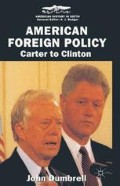Abstract
In February 1987, Secretary of State George Shultz told an audience in Denver, Colorado, that ‘the great ideological struggle that has marked this century ever since the Bolshevik revolution of 1917 has essentially been decided1) Two years prior to the Eastern European revolutions of 1989, America’s foreign policy leadership was already proclaiming victory in the ‘great contest’ of the twentieth century: the struggle between liberal, democratic capitalism and Soviet state socialism. The denouement of the Cold War inevitably constitutes one of this book’s most prominent themes. Later chapters will examine various attempts to redefine the national purpose in the wake of the apparent victory described by Shultz.
Preview
Unable to display preview. Download preview PDF.
Note
R. Reagan, An American Lif? (New York: Simon and Schuster, 1990) p. 715.
Cited in C.W. Kegley and E.R. Wittkopf, American Foreign Policy: Pattern and Proces? (London: Macmillan, 1987) p. 75.
Reprinted in G.F. Kennan, American Diplomacy 1900–195? (New York: Mentor, 1951) pp. 99, 105.
L.H. Gelb, ‘What Exactly is Kissinger’s Legacy?’, New York Times Magazin? (31 October 1976).
In 1982 constant dollars (see M.M. Ball, National Security Planning: Roosevelt Through Reaga? (Lexington: University Press of Kentucky, 1988) p. 192.
See generally F. Halliday, The Making of the Second Cold Wa? (London: Verso, 1983) chapter 2;
F. Halliday, ‘The Cold War as Inter-systemic Conflict’, in M. Bowker and R. Brown (eds), From Cold War to Collaps? (Cambridge: Cambridge University Press, 1993);
M. Cox, ‘The Cold War as a System’, Critiqu?, 17 (1986) 17–82;
J. Dumbrell, The Making of US Foreign Polic? (Manchester: Manchester University Press, 1990) chapters 1 and 2;
R. Crockatt, The United States and the Cold War 1941–5? (British Association for American Studies pamphlet, 1989).
See National Journa? (19 January 1980) (Harris polling); R.A. Melanson, Reconstructing Consensus: American Foreign Policy Since the Vietnam Wa? (New York: St Martins, 1991) p. 15.
See J. Dumbrell, Vietnam: American Involvement at Home and Abroa? (British Association for American Studies pamphlet, 1992)
O.R. Holsti and J.N. Rosenau, American Leadership in World Affairs: Vietnam and the Breakdown of Consensu? (Boston: Allen and Unwin, 1984).
See, for example, H. Cardoso and E. Falletto, Dependency and Underdevelopment in Latin Americ? (Berkeley: University of California Press, 1971).
G. Vidal, Armageddon? Essays1983–198? (London: Grafton, 1989) pp. 115–25.
See P. Kennedy, The Rise and Fall of the Great Power? (London: Unwin Hyman, 1988);
D. Calleo, The Imperious Econom? (Cambridge, Mass: Harvard University Press, 1982);
D. Calleo, Beyond American Hegemony: The Future of the Western Allianc? (New York: Basic Books, 1987);
P.G. Cerny, ‘Political Entropy and American Decline’, Milleniu?, 18 (1989) 47–63;
E.N. Luttwack, The Endangered American Drea? (New York: Simon and Schuster, 1993).
See G. Smith, ‘A Future for the Nation-State?’, in L. Tivey (ed.), The Nation-Stat? (Oxford: Robertson, 1981).
S. Gill, ‘The Rise and Decline of the Great Powers: The American Case’, Politic?, 8 (1988) 3–9, 5.
S. Strange, ‘The Future of the American Empire’, Journal of International Affair?, 42 (1988) 1–17, 5.
J.S. Nye, Bound to Lead: The Changing Nature of American Powe? (New York: Basic Books, 1991) pp. 259–60.
See also H.R. Nau, The Myth of American Declin? (Oxford: Oxford University Press, 1990).
H.H. Koh, The National Security Constitutio? (New Haven: Yale University Press, 1990) p. 211.
Cited in N.A. Graebner, America as a World Powe? (Wilmington: Scholarly Resources, 1984) p. 259.
G.W. Ball, Diplomacy for a Crowded Worl? (Boston: Little, Brown, 1976) p. 14.
Author information
Authors and Affiliations
Copyright information
© 1997 John Dumbrell
About this chapter
Cite this chapter
Dumbrell, J. (1997). Introduction. In: American Foreign Policy. American History in Depth. Palgrave, London. https://doi.org/10.1007/978-1-349-25052-3_1
Download citation
DOI: https://doi.org/10.1007/978-1-349-25052-3_1
Publisher Name: Palgrave, London
Print ISBN: 978-0-333-61094-7
Online ISBN: 978-1-349-25052-3
eBook Packages: Palgrave History CollectionHistory (R0)

